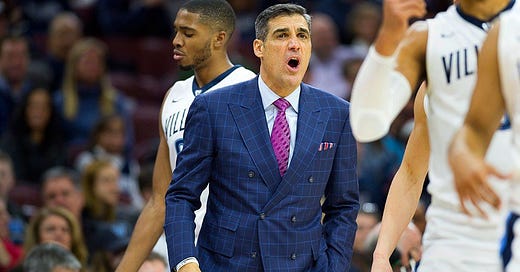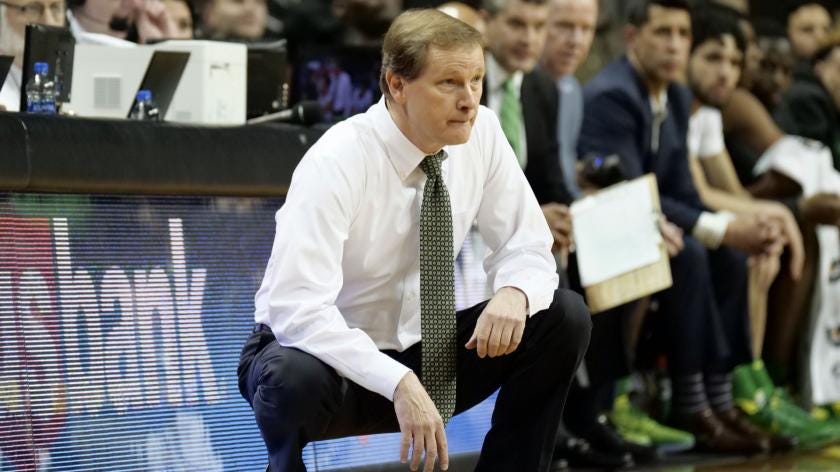College System Translation: The Trusted Programs
Are there college coaches whose style and track record are able to correlate to pro success?
In the NBA Draft world, we are all looking for data points and ways to gain an advantage. Part of that is finding trends over time that bear out consistent results. For example, it's pretty well accepted at this point that teenagers who have success in the highest leagues of Europe will enjoy NBA success. The translatability of what they do is really high.
We're all constantly looking for more areas that can have a high correlation (or even causation) for bountiful NBA careers. What statistical indicators are meaningful? What body types or physical attributes lend themselves to success?
For a long while, I've been fixated on another concept: which college basketball programs are reliable in churning out NBA-caliber products? This can come in multiple forms: programs that usually hit on their star recruits, programs who excel at developing role players for the NBA that consistently outperform their draft position, and programs that teach the game in a way that easily translates to the style that'll suit a player in the NBA. As I've thought about this over the years, I've realized that a focus on coaches, not necessarily programs, is just as important. Look at the coaches who recruit and develop talent and have a consistent track record of success.
After a quick dive into some of the negatives, we're going to fixate on those who consistently produce players that outperform draft perceptions and stick around in the league. Some are great with a specific position while others are fantastic at creating fantastic role players. Other guys, like John Calipari, Mike Krzyzewski and Roy Williams, will be omitted from the list because they recruit such a high level of talent on an annual basis that it's likely less about the coach and more about the player in terms of trends for success.
Who do we trust the most?
Jay Wright, Villanova
The best teacher of team-based sacrifice and buy-in. The elite master of fundamentals in a way that translates to ball security for role players (a must) and well-rounded play for stars. A great culture-setter. A modern architect of offensive structures.
Jay Wright truly does it all.
Point guards who come through Wright's system are incredibly tough. Kyle Lowry, Ryan Arcidiacono, Jalen Brunson... they stick around on the NBA level because they limit turnovers and are good all-around players, but they know how to run a team in ways that translate to winning. And they keep improving after their time at Villanova -- that's what is important. They leave with an understanding of how to work, the brutal honesty of what to work on and buy into whatever pathway is brought before them. That starts with the culture in Philly.
The combo guards are a unique group to me. Randy Foye, Donte DiVincenzo, Josh Hart... they find ways to be fantastic connector pieces and fill in the gaps on whatever their team needs. That's the important part about supplementary role players in the league. They have to be good at many things, rarely turn it over, play inspired defense and have enough offensive juice to stick around in the league to become a priority second contract guy. All three fit the bill, and that comes from the cultural buy-in but also the equal-opportunity motion-based offense in Philly.
Wings and forwards have similarly had success at becoming great role players. Saddiq Bey, Mikal Bridges and Eric Paschall are three of the most recent examples, though others like Dante Cunningham first paved the way.
We could gush on for hours about what Coach Wright does with his team. He's done so much for his guys that they almost all receive the benefit of the doubt when it comes to NBA evaluation. As he's moved away from playing true bigs and embraced a more modern style, it's hard to find a position that isn't pro-ready when coming out of Villanova.
Tony Bennett, Virginia
Over recent years, Coach Bennett has earned his way onto this list. At first, it was a bit of a feeling-out process for how players in his methodical, slow-down, grind-you-to-death system at Virginia would fare in a less-restricted NBA. A few years later, it's fair to say they do pretty well on the whole.
From a defensive standpoint, the demands in Charlottesville are high. Bennett runs a stingy system that is reliant on players who buy into playing on defense. With enough repetition, those habits of trying on defense stick and carry over to the pros. The schematics change a bit, but aren't that foreign to the league and since Bennett recruits for defense and competitive nature, it's a natural place to look for a plus defender.
The underrated part of Virginia prospects continues to be their offensive acumen in the league. Nearly every player outperforms their initial draft projections: DeAndre Hunter, Malcolm Brogdon and Joe Harris are the main three guys to explode, but all are solid offensive pieces. Perhaps the system that's run at Virginia (be it Mover-Blocker or PNR Motion) is so restrictive that it masks what these guys are truly capable of. Or perhaps there's more player development going on in Charlottesville.
Either way, I've found myself really drawn to the Tony Bennett guys over the years. Sure, there have been some failures, but many of them are really solid role players with latent offensive skills.
Dana Altman, Oregon
Nearly twelve years in Eugene have gone by quickly for Dana Altman, the former boss at Creighton. Since becoming a major player with Oregon money behind him and a power conference to recruit talent to, Altman has won 70% of his games coached and hit the 20-win plateau every year he's been in Oregon. The Ducks are the most successful West Coast power outside of Gonzaga, and have five Sweet Sixteen appearances to show for it.
What Altman also has is a major collection of pro players who have come through his program at one time or another. The Altman resume is much different than most programs, though. Few are one-and-done talents. Instead, coach has valued offensive skill and versatility, and produces some of the most NBA-ready upperclassmen there are. Chris Duarte, Payton Pritchard and Dillon Brooks are three of the most recent examples in that regard.
The younger guys who come through haven't worked out as well in the NBA, but still find homes. Bol Bol, Louis King, Troy Brown Jr, Jordan Bell, Chris Boucher, Damyean Dotson... there's NBA talent pretty much every year coming out of Eugene now that Altman has his program rolling.
What I love is that almost every one of these guys is a shot-maker. They all have skill and their ability within Oregon's offense shows reliable, easy translation to the NBA. It's the first place I'm looking for a fringe first-round talent.
Tom Izzo, Michigan State
Tom Izzo is tough. His teams are stingy on defense, play with fire and passion that echoes their coach and don't lack in the skill department. Izzo's track record of preparing guards to play in the NBA is silm: instead, he's thrived on multi-year point guards who stay in East Lansing until they're seniors and produce in the college game first and foremost. Cassius Winston, Bryn Forbes, Keith Appling, Kalin Lucas and Mateen Cleaves are the Spartan point guards of the last 20 years to get a shot in the NBA.
Similarly, the Spartans haven't had much success with their true post players. Matt Costello, Deyonta Davis, Adreian Payne and Paul Davis are the guys who've come through since Zach Randolph in 2000.
But Izzo's style has recently been reliant on swing forwards, the physical and skilled type who play the 4 full-time and translate to the NBA that way. They're often undersized but perimeter-oriented, terrific passers to play away from the hoop with ease and versatile enough defensively to guard more than one position.
Xavier Tillman, Jaren Jackson Jr, Miles Bridges, Branden Dawson (not a hit) and of course Draymond Green all fill that category. There's a level of translation from what they do at the 4 in Sparty country that is apples-to-apples with the NBA. So if a player comes out of an Izzo system with this experience, he'll most likely earn my trust moving forward.
Leonard Hamilton, Florida State
After 2016, something changed within Hamilton's program. He more overtly relied on depth, physical profile, switchability and athleticism. The Seminoles changed their style, routinely playing 12 guys but doing a "switch everything" defense and positionless framework that kept up with the modern game. It's particularly appropriate for wings, forwards and connector pieces who have the physical appeal to guard multiple NBA positions.
That change has worked in creating NBA talent and preparing guys for the pros. Gone are the days when Al Thornton and Chris Singleton flame out at the next level. Now, Hamilton has produced so many great wings over the last five years: Scottie Barnes, Devin Vassell, Patrick Williams, Jonathan Isaac. Even scorers like Terance Mann, Dwayne Bacon and Malik Beasley have brought enough firepower to outperform their draft stock.
We firmly believe that what Hamilton has done to change his style around in Tallahassee lets these guys pop at the next level. It's also attracted more elite-end talent lately, and that's a major positive trend for NBA scouts -- they know big names will consider FSU.
The Small Sample Size Discussion
A few coaches are well on their way to earning my trust in terms of how they recruit and develop talent, but haven't put together a long enough resume of pro players or time hasn't passed by enough to definitively evaluate a link between their program and pro success. Nonetheless, we'll give our hypothesis as to why they've done a good job preparing their guys to be steady hands at the next level.
Will Wade, LSU (2017-present), VCU (2015-17)
NBA Players: Tremont Waters, Naz Reid, Skylar Mays, Cameron Thomas, Trendon Watford, Treveon Graham
Hypothesis: Elite recruiter
Mr. Greasy-Palms himself, Will Wade has done a terrific job bringing talent into Baton Rouge. He uses them just fine when they're there, but they tend to fly under the radar in draft circles, then push their way onto rosters and into solid careers. Part of that comes from my belief that Wade is a better recruiter than coach. The talent wins out of they escape LSU young enough, latch onto an NBA team and get into their development program. They are usually highly skilled and fit the talent profile the league looks for.
Shaka Smart at non-major school, VCU (2009-15)
NBA Players: Briante Weber, Troy Daniels, Larry Sanders
Hypothesis: Defensive buy-in
Smart's time at Texas was defined by underachieved expectations, but he did churn out solid NBA talent with more hits than misses. What I'll continually remember Smart by, though, is the level of talent he produced while at VCU. Three guys who stuck around in the league and produced that came from the Rams? Pretty rare for a six-year span at a mid-major school. It's relevant now because Smart is at Marquette, the perfect combo school of VCU's allowance to recruit his style and grittiness and Texas' major conference exposure to go after big names. We fully expect that, in a few years, Marquette guys that Smart recruits will pan out well in NBA circles — just like Justin Lewis, skyrocketing up boards as we write this.





